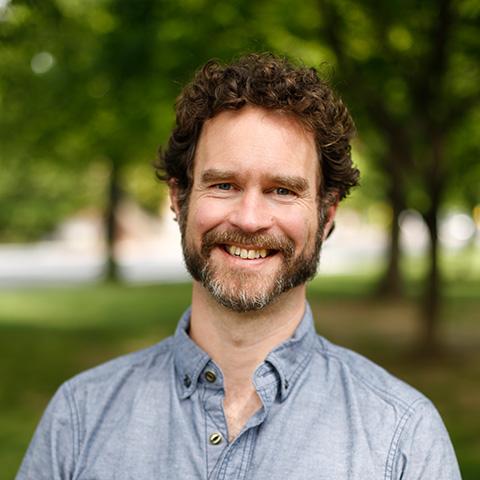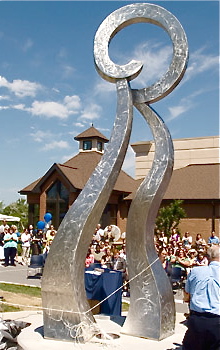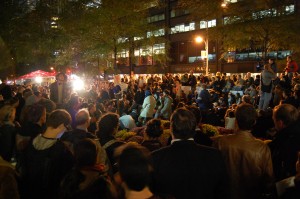
Timothy McMahan Kingis a writer, senior fellow for clergy for a New Drug Policy, and the owner of Vagabond Strategies. He is the former chief strategy officer for Sojourners and has served as a consultant for national nonprofits, advocacy campaigns, and political candidates. The author of Addiction Nation: What the Opioid Crisis Reveals About Us (Herald Press, 2019), he is an active advocate for those in recovery and to reform United States drug policy. His second book, What Are Drugs For? is forthcoming with Fortress Press. He has written widely for national publications, including The Wall Street Journal and CNN.
He's spoken and lectured across the country from Georgetown University to the Chautauqua Institution. His writing is required reading in classrooms and graduate programs across the country for his unique perspective at the intersection of faith, science, drugs, and addiction while calling for an end to a culture of punishment.
A graduate of North Park University with degrees in theology and philosophy, McMahan King has a deep interest in what healing looks like for the individual and our culture. Growing up on a farm in New Hampshire, he has a keen awareness of the ways in which our communities and the natural environment can call us into greater wholeness.
McMahan King lives with his wife, Hannah; their daughter, Ruth; and their dog, Hank, in North Carolina.
Posts By This Author
Not All Budget Cuts Are Created Equal

Less than one percent of the federal budget goes to foreign aid. Our spending on development and foreign assistance is not -- by any stretch of the facts or imagination -- our national debt.
Cutting foreign aid programs will do little to get us out of debt, but would be a devastating setback in the fight against global, extreme poverty.
Jim Wallis and Richard Land Discuss Evangelicals and 2012 Elections
Tonight, Sojourners and the Ethics and Religious Liberty Commission are co-sponsoring an event to discuss religion and the 2012 elections. Rev. Wallis and Dr. Richard Land will delve into what they believe the religious issues will be and should be from now until election day.
The event is already turning some heads. A Washington Post article by Michelle Boorstein summed up the unique nature of the event in a headline, "Evangelical opposites to hold discussion on 2012 presidential race."
Seventy-two Days Does Not a Marriage Make
It lasted 72 days. And now, Kim Kardashian and Kris Humphries are calling it quits. The two were first spotted together one year before when Kim attended one of Kris' basketball games. After a 2 million dollar engagement ring, a 10 million dollar wedding, and a 4-hour TV special about the wedding, the two were married.
Kim has assured her fans that it was not an "easy decision." It is unclear as to what she means by "easy," considering that many people spend more time considering their next purchase at Ikea than Kim and Kris spent married. The very public and very short wedding is more unfortunate evidence of the state of marriage in our society.
Some Christians blame the high rate of failed heterosexual marriages on the segment of our population who fight on behalf of more couples having the right to get married. Equal access to the rights and responsibilities of marriage are faulted for the failure of marriages for so many others. Increasingly, those messages are falling flat. After 10 of millions of dollars and countless volunteer hours spent in the passage of Proposition 8, it failed to save another California marriage.
Congressman Paul Ryan vs King Solomon
Too many people in our culture have bought the lie that human fulfillment is equivalent to market consumption.
But, if Ryan is fighting back against "class envy" and his budget plan that takes two-thirds of its cuts from programs that serve lower-income people -- then I can't make any moral sense out of it.
It's not "envy" for the 9.6 percent of the population that is unemployed each month to want jobs. It's not "envy" for parents to want to feed their kids when the 14.5 percent of American households aren't able to provide enough food for their families. It's not "envy" to want health care when you need it or to be able to pay your bills when you are working. It's not "envy" to want a quality education or to see your aging parents cared for.
There is no doubt that we have an envy and greed problem in this country. I just don't think it's "envy" to fight for fully-funded nutrition programs or to let tax breaks for millionaires expire.
Five Facts You Need to Know about Poverty in America
What you don't know about poverty can hurt you, and the nation's poor. I'm guessing there are quite a few people who don't know that the poverty line for an individual is just 22,314 a year for a family of four and $11,139 for an individual. Or, that three out of four poor adults have jobs and half of them are working full time. They also might not know that one in four children under the age of 5 live in poverty.
This morning, the Center for American Progress released their first annual report to track progress on the goal of cutting the poverty rate in our country in half over the next ten years
When Kids are Sold for Sex
When kids are sold for sex - there is no excuse.
That is why Jim Wallis signed onto a full page ad in the New York Times calling for Village Voice Media to shut down the "Adult Services" section of their Backpage.com website.
Budgets, Boredom, and Being "Stronger Together"

Our moral strength as a society comes from how we treat vulnerable populations. The rise of programs such as Medicaid and Head Start has allowed the independent living movement among those with disabilities to flourish and groups such as Heritage Christian Services do their life-changing work
But here's the problem: Heritage Christian Services just saw their funding cut by the federal government and they are concerned that worst of the cuts are yet to come.
"Spirit Day" 2011 Round-up
Do Evangelicals Hate Smart People?
Do Evangelicals hate smart people?
No. But it is such a persistent rumor that it might take something as momentous as another Protestant Reformation to see it die.
Why?
Because there are folks out there that do hate smart people. More precisely, there are people of faith who draw a line between "God's Word" and "Man's Opinion." They set up human reason as a force fighting against God's truth. While I think most Christians would agree that human reason is imperfect and limited (as humanists and scientists would probably agree as well) that doesn't make it antithetical to "God's Word." Most Christian traditions acknowledge reason as a gift from God not an enemy of God.
Deconstructing Harry: Is Jim Wallis' Ideology Really "the Doctrine of Devils"?
My friend, Harry Jackson, said that my ideology isn't "Christian" but I suspect what he really means is that it isn't Republican and that's why he disagrees with the things I have said. It's important for Christians to understand those aren't the same thing. I think Bishop Jackson's economic ideology that is indistinguishable from Republican and Tea Party talking points, but I would rather have a civil discussion together as Christians about our differences; rather than his accusing Christians who don't share his conservative economic opinions as coming from "the councils of Hell." C'mon, Harry. I believe the Bible's teachings on wealth and poverty challenge both Republican and Democratic economic views which, sadly, are both often sold out to the interests of the wealthy and large corporations, when they should be focused on the ones Jesus calls "the least of these." Can we discuss that Harry?
#OccupyWallStreet: A Generation Finds Its Voice
I had seen people my age start successful businesses, become pop-stars and even play a key role in partisan political campaigns, but I had never seen them develop and sustain a social movement.
Sure there have been more focused shifts around issues like educational equity, LGBT rights or global poverty that my generation has had a hand in shaping, but nothing that quite had the look or the feel of what I imagined the anti-War or Civil Rights movements of the 1960s to have been. I assumed we -- my contemporaries ( I'm 27) -- simply didn't possess the interest or the will-power to accomplish something that big.
I was wrong.
#OccupyWallStreet: Hand Gestures, Health Care and the Birth of a New Paradigm
 Throughout the day here at the #OccupyWallStreet mass demonstrations in New York's financial district, you can find small and often somber groups meeting.
Throughout the day here at the #OccupyWallStreet mass demonstrations in New York's financial district, you can find small and often somber groups meeting.
They have agendas, a facilitator, a time keeper, and someone to keep track of the "stack" -- the list of people waiting to make a point or ask a question.
And they also have a system of hand gestures -- a sort of gonzo sign-language adaptation of Roberts Rules of Order -- designed to keep the discussion and decision-making process both democratic and efficient.
When someone agrees with a point the speaker is making, the crowd raises two hands in agreement. When the crowd disagrees, hands quickly go up, making a downward pointing motion. To call a "point of process" crowd members shape their hands into a triangle to stop discussion. Speakers who wander off topic are quickly redirected and reminded of the point being discussed in the agenda.
These working groups bring their recommendations to the #OccupyWallStreet General Assembly, which takes place once a day. A vote is taken to determine consensus before a recommendation is passed along to the G.A.
Anyone participating in the General Assembly can block a proposal by forming an X with their arms. Participants make their case and then a revised proposal is put forth. The revised proposal can then be passed with a 90/10 consensus.
#OccupyWallStreet: Bruce Came From Vermont...

Jonathan, 19, who works at a fast food restaurant, said: "There isn't really room for religion here. We are trying to focus on the big problems we face that we all have in common. Religion gets people focused on too many specifics and divides."
His friend Chris chimed in, "How could anything that caused so many wars be any good?"
I asked a group that was serving food what they would think if more religious people joined.
"Awesome! Some Muslim guys came down and offered to do all the food one day," one young woman said.
"No way!" responded a middle-aged man who had been pointing other protestors to vegetarian sandwiches. "We just got a bunch of food donated by some church in North Carolina."
Many protesters here have had some bad experiences with religion, but it's clear that they are genuinely open to seeing religion done differently.
#OccupyWallStreet: "The First Time I Slept on the Street Was Seven Years Ago..."
 For whatever stereotype you might have in your mind about who the so-called Occupiers might be, there are some people who fit it, and whole lot more who don't.
For whatever stereotype you might have in your mind about who the so-called Occupiers might be, there are some people who fit it, and whole lot more who don't.
I traveled from Washington, D.C., to Wall Street late Wednesday because I believe it's often easier to find God on the streets than in a sanctuary.
We serve a God who shows up for those in need, and for those who stand with them.
The Gospel Should Be Offensive
Scripture constantly should be challenging our assumptions about our lives and in every aspect of society. Transformation is needed on a personal and also a political level. Scriptural priorities shouldn't be glossed over in order to protect political ideologies and comfort zones.
If we believe that what Jesus taught remains just as relevant today as it did when he physically walked among us, then it should still be a comfort to those on the margins of society and offensive to the wealthy and powerful. That doesn't mean that the wealthy and powerful can't be good and faithful followers of Christ, but Jesus did warn them that their walk will be a hard one. Wealth and power bring unique and difficult temptations ... If you never feel uncomfortable when you read the Gospels then you aren't paying attention.
CNN, Jesus and Justin Bieber
Why Christians Should Be Biased
Not every Christian who shares my concern for the poor has the same view on policy or politics. But, here is a prejudice I am not going to back away from.
To be a follower of Christ is to be biased for the poor.
In life, we all have our biases. Some of them are natural tendencies or inclinations and others are habituated. Our culture tells us to be biased -- in a deferential sense -- towards those who can pay us back or who can look out for us in return. Society tells us to get in with the strong and the powerful because they will give us strength and power in return.
Jesus teaches something very different.
Can More Taxes Make People Happier?
A new study says that might just be how it works, as long as the taxes are progressive. The study was conducted in 54 nations with over 59,000 respondents. The polling tracked the expressed well being of respondents and then checked for correlations in taxation systems. The end result? On average, those who lived in a country with a highly progressive tax system reported a higher level of quality of life, more positive daily experiences, and fewer negative ones. Overall, people are happier the more progressive their tax system is.
It's an academic paper and the authors don't jump to any political conclusions, but they do provide at least one plausible explanation. The study notes that simply increasing government spending does not increase overall happiness. But people are happier in countries with higher levels of progressive taxation because they are more satisfied with basic government services, such as quality of education and health care.
When the Earth Shakes
It was over in less than a minute. Three miles below the surface of the earth near a town in Virginia called Mineral, a fault line shifted. As a result, a 5.8 magnitude earthquake was felt from Georgia to New England and as far west as Detroit. The National Cathedral lost several stone spires, the Washington Monument cracked, and Sojourners' office was closed for the afternoon, as our building was checked for structural damage.
Tectonic plates move beneath our feet in the part of the globe that scientists refer to as the lithosphere. Over the course of a year, an average plate will move as little as 3 to 6 centimeters. The speed of their movement is 10,000 times slower than the hour hand on a clock and even slower than the rate of growth of human hair. For decades, sometimes centuries or millennia, a plate's movement might go almost entirely unnoticed. Then, in less than a minute, the world shakes and everything changes.
Ali Forney Center's Ad Supporting LGBT Homeless Youth
The first few nights weren't so bad. It was on the fourth night, the night it rained, that it got to me. I had just spent the past week sleeping on the sidewalk in front of the Illinois state Capitol building in Springfield. Throughout the week, young people of faith, college students, as well as homeless and formerly homeless youth traveled from Chicago to Springfield. Some slept on the sidewalks at night, and others came solely to lobby their legislators. We were all there for the same reason -- because each year nearly 25,000 youth experience homelessness in the state of Illinois. Not only were there not the resources to help these youth, but most legislators and most of the general public didn't even realize the problem existed.
In the past few weeks, I've written about a lot of full-page ads. This full-page ad is different. Too often, homeless youth have been invisible. The Ali Forney Center, a service provider for LGBT homeless youth, has a full-page ad in this month's issue of Sojourners magazine. GLAAD, the Gay and Lesbian Association Against Defamation, connected the Ali Forney Center to Sojourners, as a part of an advertising campaign the Ali Forney Center is running. The ad highlights that up to 40 percent of homeless youth identify as lesbian, gay, bisexual, or transgender. I have talked with many teens who became homeless because they were kicked out of their homes or ran away from abuse by their parents because of their sexual identity. After their homes became dangerous, they went to the streets, where many were attacked and some were trafficked or forced into prostitution.



